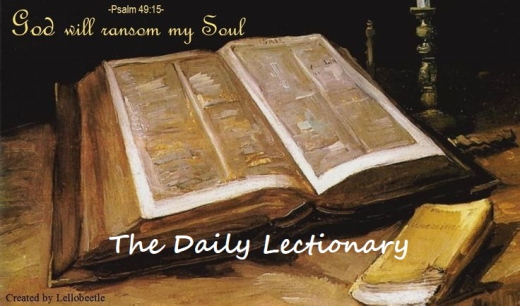 |
| Psalm 119:9-16; Deuteronomy 23:21—24:4, 10-15; James 2:1-13 |
The Daily Lectionary
TUESDAY, February 18, 2020
(Revised Common Lectionary Year A)
I delight in the law
9 How can a young person stay on the path of purity?
By living according to your word.
10 I seek you with all my heart;
do not let me stray from your commands.
11 I have hidden your word in my heart
that I might not sin against you.
12 Praise be to you, Lord;
teach me your decrees.
13 With my lips I recount
all the laws that come from your mouth.
14 I rejoice in following your statutes
as one rejoices in great riches.
15 I meditate on your precepts
and consider your ways.
16 I delight in your decrees;
I will not neglect your word.
Israel’s communal laws
23:21 If you make a vow to the Lord your God, do not be slow to pay it, for the Lord your God will certainly demand it of you and you will be guilty of sin. 22 But if you refrain from making a vow, you will not be guilty. 23 Whatever your lips utter you must be sure to do, because you made your vow freely to the Lord your God with your own mouth.
24 If you enter your neighbor’s vineyard, you may eat all the grapes you want, but do not put any in your basket. 25 If you enter your neighbor’s grainfield, you may pick kernels with your hands, but you must not put a sickle to their standing grain.
24:1 If a man marries a woman who becomes displeasing to him because he finds something indecent about her, and he writes her a certificate of divorce, gives it to her and sends her from his house, 2 and if after she leaves his house she becomes the wife of another man, 3 and her second husband dislikes her and writes her a certificate of divorce, gives it to her and sends her from his house, or if he dies, 4 then her first husband, who divorced her, is not allowed to marry her again after she has been defiled. That would be detestable in the eyes of the Lord. Do not bring sin upon the land the Lord your God is giving you as an inheritance.
…
10 When you make a loan of any kind to your neighbor, do not go into their house to get what is offered to you as a pledge. 11 Stay outside and let the neighbor to whom you are making the loan bring the pledge out to you. 12 If the neighbor is poor, do not go to sleep with their pledge in your possession. 13 Return their cloak by sunset so that your neighbor may sleep in it. Then they will thank you, and it will be regarded as a righteous act in the sight of the Lord your God.
14 Do not take advantage of a hired worker who is poor and needy, whether that worker is a fellow Israelite or a foreigner residing in one of your towns. 15 Pay them their wages each day before sunset, because they are poor and are counting on it. Otherwise they may cry to the Lord against you, and you will be guilty of sin.
The law judgment and mercy
2:1 My brothers and sisters, believers in our glorious Lord Jesus Christ must not show favoritism. 2 Suppose a man comes into your meeting wearing a gold ring and fine clothes, and a poor man in filthy old clothes also comes in. 3 If you show special attention to the man wearing fine clothes and say, “Here’s a good seat for you,” but say to the poor man, “You stand there” or “Sit on the floor by my feet,” 4 have you not discriminated among yourselves and become judges with evil thoughts?
5 Listen, my dear brothers and sisters: Has not God chosen those who are poor in the eyes of the world to be rich in faith and to inherit the kingdom he promised those who love him? 6 But you have dishonored the poor. Is it not the rich who are exploiting you? Are they not the ones who are dragging you into court? 7 Are they not the ones who are blaspheming the noble name of him to whom you belong?
8 If you really keep the royal law found in Scripture, “Love your neighbor as yourself,” you are doing right. 9 But if you show favoritism, you sin and are convicted by the law as lawbreakers. 10 For whoever keeps the whole law and yet stumbles at just one point is guilty of breaking all of it. 11 For he who said, “You shall not commit adultery,” also said, “You shall not murder.” If you do not commit adultery but do commit murder, you have become a lawbreaker.
12 Speak and act as those who are going to be judged by the law that gives freedom, 13 because judgment without mercy will be shown to anyone who has not been merciful. Mercy triumphs over judgment.
Optional parts of the readings are set off in [square brackets.]
The Bible texts of the Old Testament, Epistle, and Gospel lessons are from The Holy Bible, New International Version®, NIV® Copyright ©1973, 1978, 1984, 2011 by Biblica, Inc.® Used by permission. All rights reserved worldwide.
The Daily Lectionary is a three-year cyclical lectionary. We are currently in Year A. Beginning with the first Sunday of Advent in 2020, we will be in Year B. The year which ended at Advent 2019 was Year C. These readings complement the Sunday and festival readings: Thursday through Saturday readings help prepare the reader for the Sunday ahead; Monday through Wednesday readings help the reader reflect and digest what they heard in worship. Revised Common Lectionary Daily Readings, copyright © 2005 Consultation on Common Texts. www.commontexts.org
The Daily Lectionary for TUESDAY, February 18, 2020
Psalm 119:9-16; Deuteronomy 23:21—24:4, 10-15; James 2:1-13







